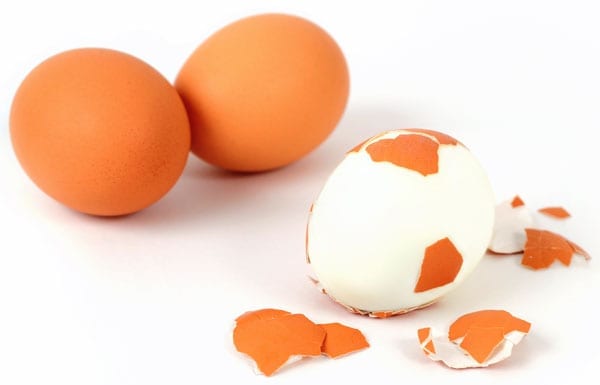 Ever wonder why some hard-cooked eggs are so difficult to peel (the shells stick to the egg and break off into itty-bitty pieces) while some eggshells slip right off?
Ever wonder why some hard-cooked eggs are so difficult to peel (the shells stick to the egg and break off into itty-bitty pieces) while some eggshells slip right off?
Well, the answer goes against everything you know about food. This is when fresh is NOT best. That is, the fresher the egg is before boiling, the more difficult it’ll be to separate the shell from the egg.
According to the USDA, eggs contain an air cell at the large end of the shell between the shell membranes. As a fresh egg ages, it slowly releases moisture and carbon dioxide through the pores in the shell. This causes the egg to shrink in size which enlarges the air cell and makes the shell easier to peel. For this reason, you might want to choose older eggs to color for Easter or for your favorite egg salad and deviled egg recipes that require lots of peeling.
Hard-Cooked Eggs Spoil Faster
Eggs have a protective coating on the shell that is washed away when hard cooked. Without the coating, bacteria can enter the pores in the shell and contaminate the egg. Be sure to refrigerate a hard-cooked egg within two hours of cooking and eat it within a week.
Green Ring
 If overcooked or cooked at too high of a temperature, a hard-cooked yolk may form an unappetizing green ring around it. This is caused by the sulfur and iron compounds in the egg reacting on the yolk’s surface. The green is safe to eat. A high amount of iron in the cooking water can also cause the green ring.
If overcooked or cooked at too high of a temperature, a hard-cooked yolk may form an unappetizing green ring around it. This is caused by the sulfur and iron compounds in the egg reacting on the yolk’s surface. The green is safe to eat. A high amount of iron in the cooking water can also cause the green ring.
How to Hard Cook an Egg
Contrary to what’s become known as a “hard-boiled egg”, never boil eggs for any length of time. Boiling affects the protein in the egg white and makes the white rubbery. For the perfect hard-cooked egg:
- Place eggs carefully in a saucepan (single layer, uncovered).
- Add enough cold water to cover the eggs with at least one inch of water over the tops of the shells.
- Add a tablespoon of vinegar. (If any eggs crack while cooking, the egg white will solidify when it touches the water and seal up the crack.)
- Heat on high only until the water starts to boil. Immediately turn off heat.
- Remove pan from the burner and cover pan.
- Let eggs stand in the hot water for 20 minutes.
- Drain water immediately.
- Cool under cold running water and add some ice cubes to stop the eggs from continuing to cook.
- Refrigerate.
![]() Fit Tip: To test an egg for freshness, see if it’ll float in water. The older egg will be more buoyant due to the larger air cell. It is still safe to eat unless it has an unpleasant smell when you crack open the shell.
Fit Tip: To test an egg for freshness, see if it’ll float in water. The older egg will be more buoyant due to the larger air cell. It is still safe to eat unless it has an unpleasant smell when you crack open the shell.


